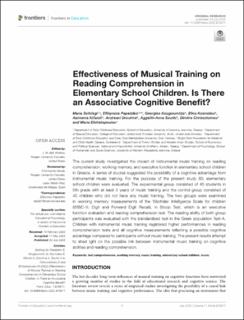| dc.contributor.author | Sofologi, Maria | |
| dc.contributor.author | Papatzikis, Efthymios | |
| dc.contributor.author | Kougioumtzis, Georgios A. | |
| dc.contributor.author | Kosmidou, Elina | |
| dc.contributor.author | Klitsioti, Asimenia | |
| dc.contributor.author | Droutme, Andreani | |
| dc.contributor.author | Sourbi, Aggeliki-Anna | |
| dc.contributor.author | Chrisostomou, Dimitra | |
| dc.contributor.author | Efstratopoulou, Maria | |
| dc.date.accessioned | 2023-01-31T12:07:20Z | |
| dc.date.available | 2023-01-31T12:07:20Z | |
| dc.date.created | 2022-07-07T08:31:10Z | |
| dc.date.issued | 2022-07-04 | |
| dc.identifier.issn | 1664-1078 | |
| dc.identifier.uri | https://hdl.handle.net/11250/3047406 | |
| dc.description.abstract | The current study investigated the impact of instrumental music training on reading comprehension, working memory, and executive function in elementary school children in Greece. A series of studies suggested the possibility of a cognitive advantage from instrumental music training. For the purpose of the present study 80, elementary school children were evaluated. The experimental group consisted of 40 students in 5th grade with at least 5 years of music training and the control group consisted of 40 children who did not have any music training. The two groups were examined in working memory measurements of the Wechsler Intelligence Scale for children (WISC-III; Digit and Forward Digit Recall), in Stoop Test, which is an executive function evaluation and reading comprehension test. The reading ability of both group participants was evaluated with the standardized test in the Greek population Test-A. Children with instrumental music training registered higher performances in reading comprehension tests and all cognitive measurements reflecting a possible cognitive advantage compared to participants without music training. The present results attempt to shed light on the possible link between instrumental music training on cognitive abilities and reading comprehension. | en_US |
| dc.language.iso | eng | en_US |
| dc.publisher | Frontiers Media | en_US |
| dc.relation.ispartofseries | Frontiers in Psychology;July 2022 | Volume 7 | Article 875511 | |
| dc.rights | Navngivelse 4.0 Internasjonal | * |
| dc.rights.uri | http://creativecommons.org/licenses/by/4.0/deed.no | * |
| dc.subject | Text comprehension | en_US |
| dc.subject | Working memory | en_US |
| dc.subject | Music training | en_US |
| dc.subject | Elementary school children | en_US |
| dc.subject | Music | en_US |
| dc.title | Effectiveness of Musical Training on Reading Comprehension in Elementary School Children. Is There an Associative Cognitive Benefit? | en_US |
| dc.type | Peer reviewed | en_US |
| dc.type | Journal article | en_US |
| dc.description.version | publishedVersion | en_US |
| dc.rights.holder | © 2022 Sofologi, Papatzikis, Kougioumtzis, Kosmidou, Klitsioti, Droutme, Sourbi, Chrisostomou and Efstratopoulou | en_US |
| dc.source.articlenumber | 875511 | en_US |
| cristin.ispublished | true | |
| cristin.fulltext | original | |
| cristin.qualitycode | 1 | |
| dc.identifier.doi | https://doi.org/10.3389/feduc.2022.875511 | |
| dc.identifier.cristin | 2037499 | |
| dc.source.journal | Frontiers in Psychology | en_US |
| dc.source.volume | 7 | en_US |
| dc.source.issue | 7 | en_US |
| dc.source.pagenumber | 1-9 | en_US |
| dc.subject.nsi | VDP::Kognitiv psykologi: 267 | en_US |
| dc.subject.nsi | VDP::Cognitive psychology: 267 | en_US |

